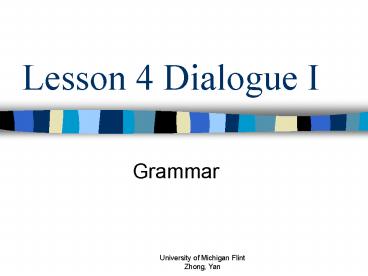Lesson 4 Dialogue I - PowerPoint PPT Presentation
Title:
Lesson 4 Dialogue I
Description:
Lesson 4 Dialogue I Grammar University of Michigan Flint Zhong, Yan Word Order in Chinese Subject (agent of the action) Adverbial (time, place, manner, etc.) Verb ... – PowerPoint PPT presentation
Number of Views:90
Avg rating:3.0/5.0
Title: Lesson 4 Dialogue I
1
Lesson 4 Dialogue I
- Grammar
2
Word Order in Chinese
Subject (agent of the action) Adverbial (time, place, manner, etc.) Verb Object (receiver of the action)
?? ??/?? ? ??
Wáng Péng zhoumò/chángcháng ting yinyuè
?? ?? ? ???
Li You míngtian c h i Zhongguó cài
??? ??????? ?? ????
Gao Wénzhong zuótian xiàwu wu dian bàn qù kàn wàiguó diànying
3
Affirmative Negative (A-not-A) Questions (II)
- In this type of question there can be no
adverbials before the verb other than time words
4
- ???????
- Ni míngtian qù bu qù?
- Are you going tomorrow?
5
- ???????????Ta jintian wanshang kàn bu kàn
diànshì? - Is she going to watch TV tonight?
6
- If there is an adverbialsuch as
- ? (hen, very),
- ? (dou, all),
- ?? (chángcháng, often)
- before the verb, the ? type question must be used
instead.
7
Are they all students?
- ????????
- Tamen dou shì xuésheng ma?
- ?????????X
- Tamen dou shì bu shì xuésheng? X
8
Do you often go to the movies?
- ????????
- Ni chángcháng kàn diànying ma?
- ?????????X
- Ni chángcháng kàn bu kàn diànying? X
9
Is Dr. Wang very busy?
- ???????
- Wáng yisheng hen máng ma?
- ????????X
- Wáng yisheng hen máng bu máng? X
10
If there is more than one verb, the question form
applies to the first verb
- Do you want to dance?
- ???????
- Ni xiang bu xiang tiào wu?
- ???????X
- Ni xiang tiào bu tiào wu? X
11
Which sentence is correct?
- ??????????
- Ni de tóngxué qù bu qù da qiú?
- ??????????
- Ni de tóngxué qù da bu da qiú?
12
The Conjunction ?(?) (nà me, then in that case)
- In a dialogue, immediately following a statement
by speaker A, speaker B can often start with
?(?)(nà me), which links up the sentences by
the two speakers.
13
- A
- ????????
- Jintian wanshang méi shìr.
- We have nothing to do tonight.
- B
- ???????,????
- Nàme women qù kàn diànying, zenmeyàng?
- In that case, lets go to see a movie. Hows that?
14
- B
- ?????
- Nà míngtian ne?
- Then how about tomorrow?
- A
- ?????,???????
- Wo jintian hen máng, bù xiang qù chi wanfàn.
- Im very busy today. I dont want to go to dinner.
15
A ??????????? Ni xihuan bu xihuan chi Meiguó
cài? Do you like to eat American food or not?
B ???? Bù xihuan. No, I dont. C
???????,???? Nà women chi Zhongguó cài,
zenmeyàng? Then lets eat Chinese food. Hows
that? D ?????? Wo ye bù xihuan. I dont
like that either.
16
? (qù, to go) Action
- If the performance of an action involves a change
of location, then this is the construction we use.
17
- ???????????
- Míngtian wanshang women qù kàn diànying.
- We are going to see a movie tomorrow night.
18
- ????????
- Wanshang wo bú qù tiào wu.
- I will not go dancing tonight.
19
- ??????,?????
- Zhoumò wo qù tiào wu, ni qù bu qù?
- Ill go dancing this weekend. Are you going?
20
Questions with ?? (hao ma)
- To solicit someones opinion, we can ask ?? (hao
ma) after stating an idea or suggestion. - You will also hear people say ??? (hao bu hao),
instead of ?? (hao ma).
21
- ??????,???
- Women qù kàn diànying, hao ma?
- Well go see a movie, all right?
22
- Well eat Chinese food tonight, all right?
- ??????????,???
- Women jintian wanshang chi Zhongguó cài, hao ma?
23
??
- ??































